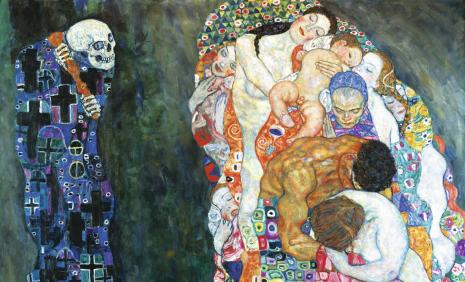
October 2, 2012, by Stephen Mumford
Mortality
In spite of all the hubris humanity has indulged, the riches and the vanity, the hopes and ambitions, an unwelcome intruder always stops us in the end. Death – that unspoken inevitableness – is our shared destination. Nothingness, our fate.
How can the rational person face it? And how do we face our preceding lives in the knowledge of death’s inescapability? Some try to deny it, seeking refuge in an afterlife, and even claim it to be a better state than the present. But suppose I think of death as final. No more. A terminus.
I have long taken solace in some brief comments made by Wittgenstein (Tractatus 6.431, and following). With death, my world does not change but comes to an end. Neither an afterlife, nor death itself, will be a part of my experience. I see no time at which I am deceased: all known times will be times at which I live. Is this enough to give me some form of immortality? An experiential immortality? In a way, yes: but only in that one way.
Mortality intrudes on the lives of the living rather than on the dead. We bear witness to the departures of others: loved ones, friends and family, strangers. And at such points, we feel we experience something profound: the fragility of existence; the humility of our own situation; that we are in this position together; paradoxically – the wonder of life. Technology, economics and medicine may delay the final passing, but no more than delay. We each have to prepare. And more to the point, we ought each to maximise the potential that our lives give us as if we soon will reach our end: for we certainly will.

In a letter to Hannah Arendt, Heidegger encloses the following poem:
“Death
Death is the world’s own rhyme,
Being’s mountain chain.
Death will evade what’s yours and mine
in the falling weight
falling towards silence’s tor,
star of earth, nothing more.”
The poem was originally enclosed in a correspondence of February 1950 but it its impact is most felt years later, in November 1970, to the occasion of the death of Arendt’s husband, Heinrich Blücher. A death to which Arendt relates to the loss of a world. A world that “disintegrates when the other has gone away.”
Of all our possibilities, death is the only one to which we can be sure and yet – it’s marked by an utmost impossibility. Thus given, I don’t know to which extent we can be rational in the face of death. Maybe we simply can’t. However, what the certainty of death and the consciousness of our own finitude call us for is to something even more prior to rationality itself – a consideration of the role of chance in determining the place or the spaciality of man.
To that – whenever I’m struck by thoughts about my own mortality and to what worlds may grow within the borders of my own space, I am suddenly and involuntarily taken back to Cavafy’s Ithaca and I say –
“(…)
Have Ithaca always in your mind.
Your arrival there is what you are destined for.
But don’t in the least hurry the journey.
Better it last for years,
so that when you reach the island you are old,
rich with all you have gained on the way,
not expecting Ithaca to give you wealth.
Ithaca gave you a splendid journey.
Without her you would not have set out.
She hasn’t anything else to give you.
(…)”
Feel free to interpret Ithaca as you may.